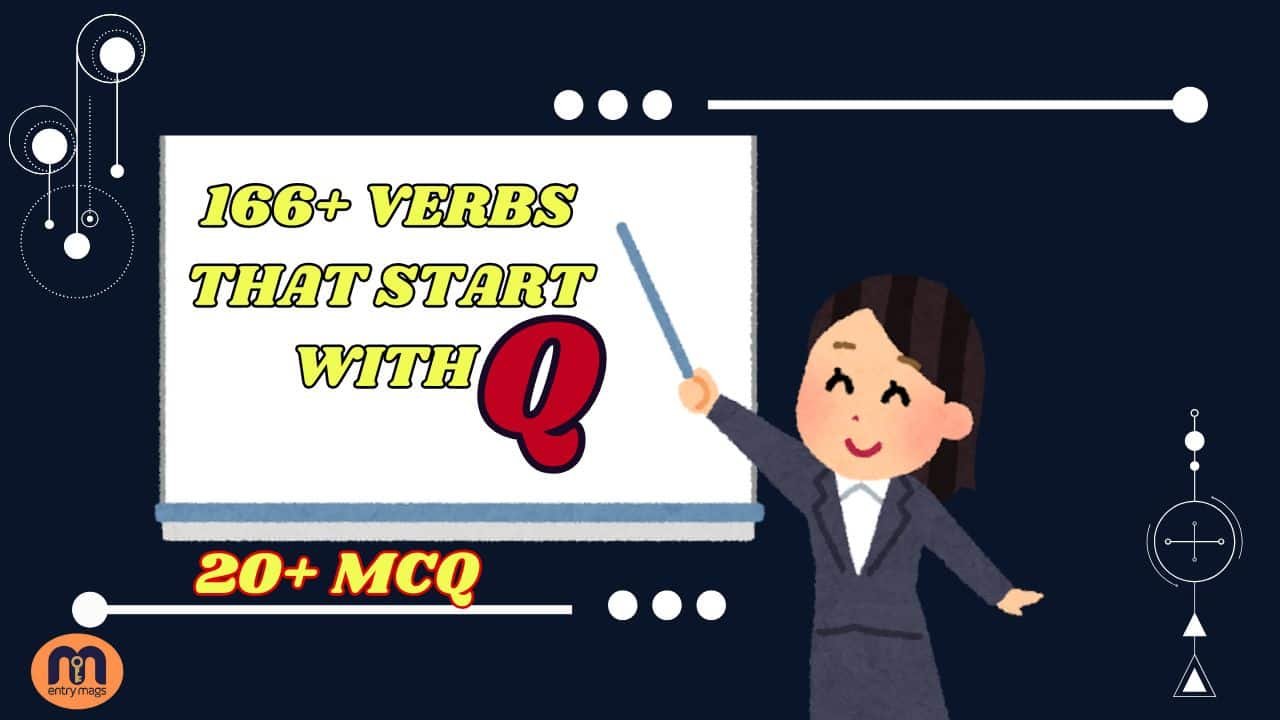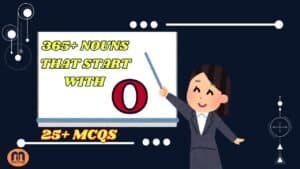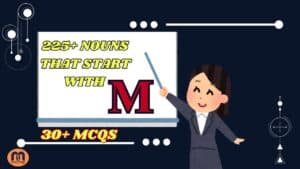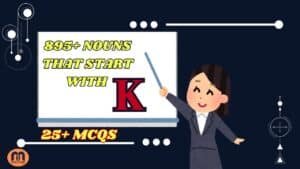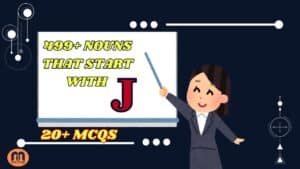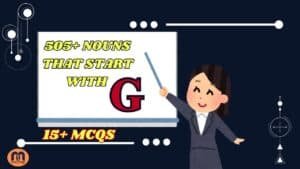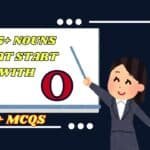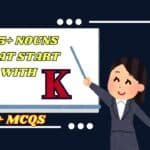Verbs That Start With Q: When we think of the letter “Q,” words like “quick,” “quiet,” or “question” may immediately come to mind.
But did you know that there are many more fascinating verbs that start with this often-overlooked letter? From quirky actions to powerful verbs that express unique ideas, this list will broaden your vocabulary and help you communicate more vividly.
Whether you’re a writer seeking inspiration or just a lover of language, learning these words can enrich your everyday conversations and writing.
In this article, we’ll explore over 166+ verbs that start with “Q,” breaking them down into manageable categories. We’ll also dive into how to use them in everyday contexts to make your speech and writing stand out.
Let’s begin!
What Makes Verbs Starting With “Q” Special?
The letter “Q” might not be the most common starting letter in the English language, but it carries a certain power and intrigue. Many words starting with “Q” are unusual or rare, which can make them more memorable. These verbs often convey specific actions, offering a precise way to describe movement, change, or behavior.
Using unique verbs can help you:
- Enhance clarity in your communication.
- Create a distinctive voice in your writing.
- Boost your vocabulary, making your speech more engaging.
Verbs That Begin With “Q” and Their Meanings
Let’s dive into some unique and interesting verbs that begin with the letter “Q.” We’ll break them down into categories based on their meanings and use cases.
Action Verbs
These verbs express physical or mental actions.
- Quack: To make the characteristic sound of a duck or mimic this sound.
- Qualify: To meet the required standards or conditions for something.
- Quantify: To measure or express the quantity of something.
- Quarrel: To argue or dispute with someone.
- Quench: To satisfy thirst or extinguish a fire.
- Quickstep: To move briskly or quickly, especially in a dance.
Cognitive and Emotional Verbs
These verbs relate to thinking, feeling, or understanding.
- Qualify: To make a statement more specific or limit its meaning.
- Question: To ask something to seek information or clarify.
- Quibble: To argue or raise objections over trivial matters.
- Quash: To reject or invalidate something, especially a decision or statement.
- Qualm: To feel uneasy or have doubts.
Movement and Change Verbs
These verbs express actions involving motion or change.
- Quail: To shrink back in fear or intimidation.
- Quicken: To speed up or accelerate a process.
- Quiver: To shake or tremble slightly, often from emotion or cold.
- Quell: To suppress or put an end to something, like a rebellion.
- Quilt: To stitch together materials, often for warmth or decoration.
Communication Verbs
Verbs associated with how we convey messages.
- Quip: To make a witty remark or a clever comment.
- Quash: To put an end to something (often related to statements or claims).
- Quiz: To question or examine someone, often in a playful or detailed manner.
- Quote: To repeat or refer to something said or written by another.
Verbs of Interaction
These describe actions related to interaction with others.
- Quarrel: To engage in an argument or fight.
- Quibble: To argue or complain about minor details.
- Quotient: To divide or calculate, especially in mathematical terms.
Verbs Indicating Thought and Reflection
These verbs involve cognitive processes and reflective thinking, helping you describe mental actions clearly.
- Qualify: To limit or specify the meaning of something.
- Quibble: To argue or raise objections over trivial matters.
- Query: To ask or inquire about something.
- Quash: To reject or invalidate a claim, decision, or action.
- Quail: To shrink back or feel afraid.
- Qualm: To feel uneasy or have doubts about something.
- Quench: To satisfy thirst or extinguish something, like a fire.
- Quickstep: To move briskly, often used in a dance.
- Quotient: To divide or calculate a result, often in math.
- Quiz: To examine or ask questions for testing knowledge.
Verbs Indicating Movement
These verbs convey actions related to physical motion, change, or movement.
- Quail: To recoil or shrink back from something in fear.
- Quicken: To accelerate or speed up the movement of something.
- Quiver: To shake or tremble, often from emotion or fear.
- Quake: To tremble or shake, especially from a sudden force or shock.
- Quilt: To stitch or sew materials together.
- Quickstep: To move quickly in a lively, energetic manner, often in a dance.
- Quash: To put an end to something with force.
- Quicken: To hasten or speed up the process of something.
- Quilt: To craft something by piecing together various materials, often fabric.
- Quiver: To tremble or vibrate, often involuntarily.
Verbs Expressing Communication
These verbs describe different ways of interacting, sharing information, or expressing thoughts.
- Quip: To make a witty or sarcastic remark.
- Quiz: To ask questions or test someone’s knowledge.
- Quote: To repeat or cite someone’s words or written text.
- Quibble: To argue over small, unimportant details.
- Query: To ask about or inquire for information.
- Quash: To formally reject or annul a statement or claim.
- Quotient: To divide and provide the result, often in mathematical contexts.
- Qualify: To limit the meaning of something or make it more specific.
- Quickstep: To perform a fast-paced movement or action, especially in dance.
- Quack: To utter a sound that imitates the duck’s call, or to falsely claim expertise.
Verbs of Disruption
These verbs describe actions that interrupt or disrupt the normal flow of events.
- Quell: To suppress, put an end to, or calm something.
- Quash: To invalidate or nullify a decision or action.
- Quiver: To tremble or shake slightly, often from fear or anxiety.
- Quake: To shake or tremble, especially from an external force like an earthquake.
- Quail: To feel fear or shrink back from something.
- Quibble: To argue or raise objections about trivial matters.
- Quickstep: To move briskly, often in a way that disrupts the usual pace.
- Quench: To extinguish a fire or to satisfy thirst.
- Quip: To make a quick, often sarcastic or witty, remark.
- Qualm: To experience doubt or hesitation, often about a decision.
Verbs That Connote Energy and Force
These verbs describe actions that are characterized by energy, movement, or force.
- Quicken: To accelerate the speed of something or to make it faster.
- Quake: To shake or tremble from the force of something.
- Quell: To suppress or put an end to something with force.
- Quash: To forcibly stop or invalidate something, often legally.
- Quiver: To shake slightly or tremble due to an emotion or physical response.
- Qualify: To narrow or limit something with specific criteria or standards.
- Quench: To extinguish or satisfy something, such as thirst.
- Quickstep: To make rapid movements, often with energy and purpose.
- Quail: To recoil in fear or shrink from something.
- Quip: To make a sharp or witty remark in response to something.
Verbs Indicating Positive Influence
These verbs involve actions that improve or enhance conditions or situations.
- Qualify: To meet a required standard, making something valid or accepted.
- Quench: To satisfy or relieve thirst, or to extinguish a fire.
- Quip: To offer a humorous or clever remark, adding positivity to a conversation.
- Quickstep: To engage in a lively or upbeat dance, often spreading positive energy.
- Quicken: To speed up a process or activity, making it more efficient.
- Quail: To back down from fear, often leading to avoiding conflict or danger.
- Quilt: To create something useful or decorative, like a quilt, with purpose and care.
- Qualm: To experience doubt or hesitation, but also potentially leading to positive reflection.
- Quarrel: To engage in a dispute, but sometimes leading to resolution or understanding.
- Quibble: To argue over minor details, which could lead to refining or clarifying issues.
Verbs of Interaction and Engagement
These verbs describe how we engage with others, either through conversation, action, or interaction.
- Quarrel: To argue or engage in a dispute.
- Quibble: To argue over insignificant details, often resulting in a minor dispute.
- Quiz: To ask questions or interrogate in a testing or engaging manner.
- Quotient: To divide or calculate the result of an operation, such as division.
- Quip: To make a witty or clever remark, often in response to someone.
- Quail: To shrink back or retreat in fear from something.
- Quicken: To hasten or accelerate a process, which may involve interaction.
- Quickstep: To engage in a fast, energetic dance step, often in a partner setting.
- Quench: To extinguish or satisfy, often used metaphorically in the context of desires.
- Qualify: To limit or specify the qualifications needed for something.
Verbs of Creation and Craft
These verbs relate to making, creating, or assembling something, whether physically or metaphorically.
- Quilt: To sew or stitch materials together, creating a finished product.
- Qualify: To refine or perfect something to meet a specific need.
- Quench: To cool or satisfy, such as quenching thirst with water.
- Quicken: To bring something to life or accelerate its development.
- Quiver: To shake or vibrate, often implying movement in a creative sense.
- Quip: To create a clever or witty remark, often in a creative context.
- Quash: To put an end to or invalidate a creation or idea.
- Query: To inquire or question, often as a step in understanding or creating something.
- Quickstep: To make quick, precise movements, often involved in creation like dance.
- Quarrel: To engage in a dispute, sometimes resulting in new understandings or ideas.
Verbs Associated with Surprise or Unexpected Change
These verbs describe actions that involve suddenness, unexpected change, or shock.
- Quiver: To tremble or shake, often due to surprise or emotional response.
- Quake: To shake or tremble, especially due to sudden external forces.
- Quell: To suppress or end something abruptly, like a disturbance.
- Quash: To invalidate something quickly or unexpectedly.
- Quail: To react in fear or surprise, shrinking away from something.
- Quip: To make an unexpected, witty remark that surprises others.
- Quickstep: To move briskly, often in response to a change in pace or situation.
- Quench: To unexpectedly satisfy a desire or extinguish something, like thirst or a fire.
- Query: To ask something suddenly, seeking clarity in unexpected situations.
- Qualify: To add restrictions or specifications, sometimes resulting in unexpected changes.
Verbs Associated with Legality and Formal Actions
These verbs have legal or formal connotations, often related to validity or action.
- Quash: To annul or invalidate something, especially a decision or judgment.
- Qualify: To meet the specific criteria or standards, especially in legal contexts.
- Quibble: To raise objections or make small disputes, often in formal settings.
- Query: To ask about a statement, decision, or action, especially in a formal or legal manner.
- Quiz: To question or interrogate someone, especially for information or clarification.
- Quotient: To divide or calculate, often in mathematical or legal contexts.
- Quarrel: To engage in a formal dispute or argument, especially in legal matters.
- Quip: To make a quick, sometimes witty remark, even in serious settings.
- Quickstep: To move quickly or precisely, especially in response to formal directives.
- Quail: To hesitate or back down from a decision, particularly in a formal setting.
Why Should You Use Verbs Starting With Q?
Incorporating rare or unique verbs in your vocabulary has many benefits:
- Precision: Some “Q” verbs, like “quench” or “qualify,” offer a precise way to express ideas.
- Variety: Using different verbs keeps your language fresh and engaging, preventing repetition.
- Impression: Rare verbs can make you sound more educated and thoughtful, impressing your audience.
Examples in Action
Here are a few ways to use some of these “Q” verbs in everyday speech:
- “She quibbled about the smallest details, never happy with anything.”
- “His attempt to quench his thirst after the long run was a relief.”
- “They quickly quarreled over the project’s direction, but managed to reconcile in the end.”
- “The general quickly quelled the revolt before it spread.”
Expanding Your Vocabulary: How to Use These Verbs Effectively
To truly master these verbs, here are a few tips:
- Context is key: Some “Q” verbs, like “quibble,” might be more appropriate in casual conversation, while others like “quantify” are better suited for formal settings.
- Practice: Try using these verbs in your writing or daily interactions. The more you practice, the more natural they will feel.
- Be mindful of tone: Some verbs may sound more formal or old-fashioned, so always consider the tone of your conversation or writing.
Conclusion: The Power of a Unique Verb
The letter “Q” may not be the most common in the English language, but verbs starting with it carry a certain flair and energy. By incorporating them into your vocabulary, you can add variety, precision, and creativity to your communication.
Take the time to practice these unique verbs in your writing and conversations. You’ll find that using specific words not only helps you express yourself more clearly but also helps you stand out in a world where communication is key.
So, what will your next “Q” verb be? Start with one today and watch your language skills soar!
MCQs: Verbs That Start With Q
1. Which of the following verbs means “to argue over trivial details”?
- A) Quail
- B) Quibble
- C) Query
- D) Quickstep
Answer: B) Quibble
2. Which verb refers to “to shrink back or recoil in fear”?
- A) Qualify
- B) Quash
- C) Quail
- D) Quicken
Answer: C) Quail
3. What is the meaning of the verb “Quench”?
- A) To move briskly
- B) To satisfy thirst or extinguish a fire
- C) To make a witty remark
- D) To quickly divide or calculate
Answer: B) To satisfy thirst or extinguish a fire
4. Which verb means “to hasten or speed up a process”?
- A) Quickstep
- B) Quiver
- C) Quicken
- D) Quip
Answer: C) Quicken
5. Which of these verbs means “to make a clever or witty remark”?
- A) Quash
- B) Quip
- C) Quill
- D) Query
Answer: B) Quip
6. What does the verb “Quake” mean?
- A) To engage in a dispute
- B) To shake or tremble, especially from fear or force
- C) To calculate or divide in math
- D) To satisfy or extinguish thirst
Answer: B) To shake or tremble, especially from fear or force
7. Which verb means “to suppress or end something, like a disturbance or rebellion”?
- A) Quill
- B) Quell
- C) Quickstep
- D) Quarrel
Answer: B) Quell
8. Which verb refers to “to make something faster or accelerate”?
- A) Quiver
- B) Quicken
- C) Qualify
- D) Quibble
Answer: B) Quicken
9. Which of the following verbs means “to ask a question or inquire”?
- A) Query
- B) Quip
- C) Quilt
- D) Qualm
Answer: A) Query
10. Which verb means “to invalidate or nullify something, especially a decision”?
- A) Quibble
- B) Quash
- C) Quail
- D) Quiz
Answer: B) Quash
11. Which verb refers to “to stitch or sew together materials to make a quilt”?
- A) Quilt
- B) Quickstep
- C) Quench
- D) Quip
Answer: A) Quilt
12. What does the verb “Quarrel” mean?
- A) To ask detailed questions
- B) To engage in an argument or dispute
- C) To make quick movements
- D) To shake or tremble
Answer: B) To engage in an argument or dispute
13. Which verb means “to argue over minor details or objections”?
- A) Quibble
- B) Quash
- C) Quicken
- D) Query
Answer: A) Quibble
14. What is the meaning of the verb “Quickstep”?
- A) To move briskly or in a lively manner, often in dance
- B) To question someone formally
- C) To suppress a rebellion
- D) To divide or calculate a result
Answer: A) To move briskly or in a lively manner, often in dance
15. Which verb refers to “to question or inquire for information”?
- A) Quiz
- B) Quip
- C) Quench
- D) Quail
Answer: A) Quiz
16. Which verb means “to shake slightly or tremble, often involuntarily”?
- A) Quiver
- B) Quickstep
- C) Quake
- D) Qualify
Answer: A) Quiver
17. Which verb means “to write with a quill pen”?
- A) Quill
- B) Quip
- C) Quake
- D) Quell
Answer: A) Quill
18. What is the meaning of the verb “Qualify”?
- A) To make a statement specific or limit it
- B) To cause to move faster
- C) To extinguish a fire
- D) To shake from fear
Answer: A) To make a statement specific or limit it
19. Which verb means “to divide something and provide the result, often in mathematics”?
- A) Quickstep
- B) Quash
- C) Quotient
- D) Quill
Answer: C) Quotient
20. Which verb means “to engage in a witty or clever remark”?
- A) Quench
- B) Quip
- C) Query
- D) Quake
Answer: B) Quip
Read more knowledgeable blogs on Entry Mags
